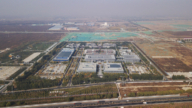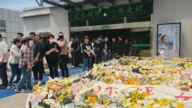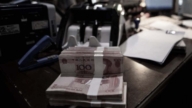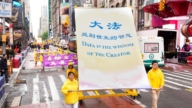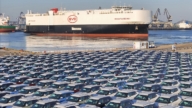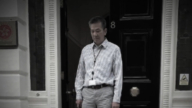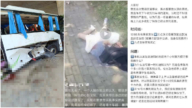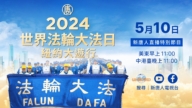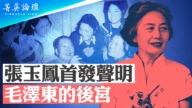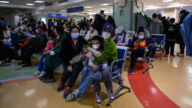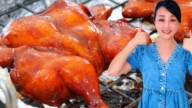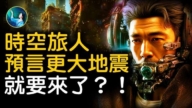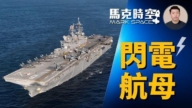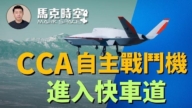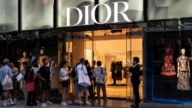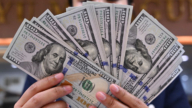【新唐人2012年5月25日訊】世界銀行5月23號發佈《東亞與太平洋地區經濟更新》的報告中,下調對中國年度經濟增長率的預估,並表示,單純依靠國家投資及低附加值商品出口的發展模式,不可持續。中共政府必須減少稅賦、增加福利,並且進行「市場化改革」,以刺激「內部消費」。 學者認為,中共當局從來不考慮百姓的利益,現實也讓「國富民窮」的政策不會改變。
「世界銀行」在報告中說,中國本年度經濟增長率的預估從8.4%下調至8.2%,中國經濟增速放緩,將導致東亞地區新興經濟成長率降到兩年最低點。「世界銀行」敦促中國採取「鼓勵內需增長」的政策以刺激經濟,而不是單純依靠增加國家投資。
「世界銀行」建議的刺激中國內需政策包括「減稅、增加社會福利投入」等,並說,這應該是中國金融政策調整的重點。
美國南卡羅萊納大學艾肯商學院教授謝田:「我覺得世界銀行的看法是對的,就是說用減稅,增加社會福利支出、其他社會支出,用這個方法,支持消費的財政措施來支持中國經濟,這個說法實際上也是以前海內外的學者、經濟學家都積極宣導的。從中共本質上來說和中共整個財政狀況來說,這個基本上是很難被中共所採納的。」
現實中,中共採取的措施也與「世行」建議的相反。
24號,多個中共媒體以「國務院:加快建設鐵路等重大基礎設施項目」主題,要求中國加快對重大基礎設施項目的投資。溫家寶在主持召開的國務院常務會議上,要求啟動一批重大項目投資,鼓勵民間投資參與鐵路、能源、電信等領域建設等。
溫家寶還表示,將加大對國家重點「在建專案」的信貸投放。
謝田指出,對「重大專案投資」不僅會造成通貨膨脹,而且也會越來越使得資源、生產資本、財富越來越集中,而且高房價、高通膨、高教育和醫療費用,使全體百姓相對貧困化,這也是「世行」不建議中國「靠投資 換增長」的原因,也是中國內需不旺的原因。
謝田:「中國實際上一直用對重大基礎專案進行投資,重點在建項目大量投放信貸,用這個辦法來支持中國經濟的增長。這個做法的結果,我們知道實際上越來越變得國富民窮。」
「世行」報告還指出,中國投資率已經處於極高水準,無法在不造成社會及環境負面後果的情況下,再進一步大幅提高。
謝田認為,中共從來不願意在老百姓身上花錢,但目前加大基礎建設投資是中共不得不做的事情。
謝田:「基礎投資會增加就業,而如果就業上不去或者失業人數太多,會危及中共的政權。尤其在當今狀況下,中共政權岌岌可危,政權內鬥也好、各派之間紛爭處在一個非常關鍵的狀態,而這個時候任何可能危及政權穩定的事情,都是他們不能接受的。」
國務院研究室和社科院聯合調查報告指出:截至2011年6月,同年的「公車消費」為9865億,「公款吃喝」為8963億,「公費出國旅遊」為8800億,舉辦各類活動「招待貴客」為8900億。
全國人大辦公廳研究員王錫鋅2011年在《新聞1+1》節目中透露:「公款接待、公費出國考察、公車,一年19000億,佔行政開支的60%。」
時事評論員伍凡指出,現在中國出口減少、關稅減少、國內市場蕭條,收稅也減少,加上外資外流,中資外逃,還有天文數字的「三公消費」,經濟問題成了死結 。如果不採取「非常手段」來進行徹底的改革,中國的政治、經濟問題將會引起中國的大動亂!這已經擺在中國大陸每個人的面前。
採訪/陳漢 編輯/宋風 後製/君卓
World Bank Lowers China’s Growth Forecast
The World Bank released its latest report
on East Asia and Pacific Economic Update on May 23.
The report lowers China’s economic growth forecast.
The development model is purely driven by state investment.
Low value-added export is unsustainable.
The report suggests the Chinese Communist Party (CCP)
adopts domestic demand-based stimulative policies.
These policies can cut taxes, increase social welfare
and implement “market-oriented reforms.”
Scholars remark that the CCP authorities inherently ignore
the people’s interests.
Its policy of “enriching the regime while impoverishing
the populace” will remain unchanged, the experts say.
The World Bank report trims China’s economic growth rate
to 8.2% from 8.4% which it previously predicted.
China’s economic slowdown will lead to the lowest
growth rate of emerging East’ economies, says the report.
World Bank urged China to adopt domestic demand-based
policies to push the economy, instead of just boosting the state investments.
The World Bank report suggests some measures:
“Fiscal measures to support consumption,
such as targeted tax cuts, social welfare spending
and other social expenditures, should be viewed as the first priority.”
Prof. Frank Tian Xie (Business, Univ. of South Carolina):
“The World Bank’s view is correct, I think.
Tax cuts, higher social welfare spending and other social
expenditures support consumption, lifting China’ economy.
The same view was held by overseas scholars
and economists over the past years.
CCP will hardly apply such measure considering its nature
and the regime’s holistic financial position."
In reality, the actions taken by the CCP,
are just the opposite.
On May 24, CCP’s media issued an article, “State Council:
Hasten Railway Investments & Major Infrastructure Projects”
Premier Wen Jiabao chaired a State Council meeting,
calling for a number of major project investments to begin.
He encouraged private investments on railways, energy,
telecommunications and other infrastructure constructions.
Wen Jiabao said the regime will increase credit supplies
on the state’s key projects under construction.
Professor Xie comments that “the major project
investments” would cause inflation.
Further, the policy will make resources, productive capital
and wealth increasingly concentrated.
While high house pricing, high inflation, high education cost
and medical treatment will pauperize the populace.
Professor Xie pinpoints this as the reason the World Bank
does not recommend China’s investment-driven growth.
This can also explain China’s stagnant domestic demand,
according to Frank Xie.
Prof. Xie: “China’s heavily invested major infrastructure’
projects have cast a light on projects under construction.
This is the approach they keep applying
to support economic growth.
We’ve seen that in reality the result enriches the regime,
but impoverishes the people more and more."
The World Bank report discusses this issue too:
“Investment rates are already extremely high and
cannot be increased much further without adverse social
and environmental consequences.”
Professor Xie points out that the CCP never willing to
spend money for the wellbeing of the people.
However, there’s no option, the regime have to increase
of infrastructure investment due to the current situation.
Professor Xie: “The infrastructure investment’ increase
could boost job employment. The high unemployment rate would endanger its ruling power.
Especially today, the CCP regime is on the ropes,
with its factional infightings entering a very critical stage.
So at this moment, its top leadership cannot accept
anything that might imperil its ruling stability.”
A joint survey report was made by the State Council
Research Office and the Academy of Social Sciences.
It showed that as of June 2011, the year’s official-purpose
car expenses amounted to RMB986.5 billion.
Official-purpose reception meal expenses: RMB896.3 billion.
Official-purpose traveling abroad spending: RMB880 billion.
Varied activities held for entertaining VIPs
cost RMB890 billion.
A national congress’ office researcher, Wang Xixin
revealed a figure in CCTV’s “News 1+1″ program in 2011.
He said, three official-purpose expenses were “1.9 trillion
a year, accounting for 60% of administrative expenses."
Critic Wu Fan thinks the economic issue
has become a taut knot for the CCP’s regime.
China has fewer exports, dropping tariff income, domestic
market recession, taxation revenue fall and capital outflows.
Plus the astronomical figures
of the three official-purpose expenditures.
Wu remarks that if no reform is carried out, major turmoil
may be triggered by China’s political and economic issues,
“This is the true fact that every Chinese
need to face right now,” says Wu Fan.


